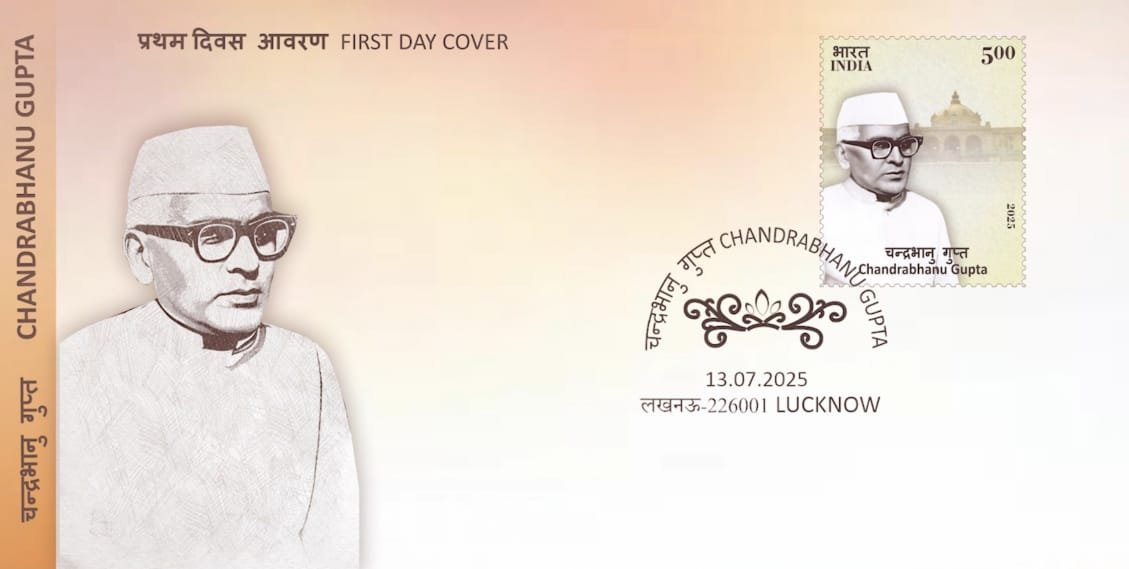Chandrabhanu Gupta

Technical Data
| Date of Issue | July 13, 2025 |
|---|---|
| Denomination | Rs. 5 |
| Quantity | 302,852 |
| Printer | Security Printing Press, Hyderabad |
| Printing Process | Wet Offset |
| Colors | Multicolor |
| Credit (Designed By) | Ms. Priya Pandey |
| Catalog Codes |
Colnect codes IN 2025.07.13-01 |
| Themes | Famous people | Independency Activists | Men | Politicians |
Chandrabhanu Gupta Stamp – Honoring a Freedom Fighter and Visionary Leader
The Chandrabhanu Gupta stamp, issued by India Post, commemorates the remarkable journey of a freedom fighter, advocate, and statesman who dedicated his life to India’s independence and public service. From defending revolutionaries in the historic Kakori Train Action Case to serving as the Chief Minister of Uttar Pradesh four times, Chandrabhanu Gupta left behind an inspiring legacy of courage, leadership, and social welfare.
Early Life and Education
Chandrabhanu Gupta was born on July 14, 1902, in Bijauli village of Aligarh district, Uttar Pradesh. He completed his early schooling in Lakhimpur and later earned his MA in Political Science and LLB from Lucknow University, equipping him with the knowledge and skills that would shape his future as a freedom fighter and politician.
Role in the Freedom Struggle
On April 14, 1930, Gupta led the movement to break the salt law in Lucknow and was sentenced under Section 117 of the Criminal Procedure Code. Initially awarded one and a half years of imprisonment, his sentence was later reduced to six months after intervention from George Jackson, President of the Awadh Bar Association. Gupta endured imprisonment in both Lucknow Jail and Ghazipur Jail, experiences that strengthened his resolve to serve the nation.
Political Career and Leadership
Gupta’s political journey was long and distinguished. He was elected to the Uttar Pradesh Legislative Assembly in 1937, 1946, 1952, 1961, 1962, 1967, and 1969. He also served in the Uttar Pradesh Legislative Council (1960–61) and held various ministerial posts between 1947 and 1959. On December 7, 1960, he became the Chief Minister of Uttar Pradesh for the first time and went on to serve four terms until 1970. His governance was marked by efficiency, vision, and progressive ideals.
Social Reforms and Institutions
Gupta firmly believed in social service and nation-building. He established the Motilal Memorial Society in 1935 and the Bharat Seva Sansthan in 1964 in Lucknow. Both institutions continue to promote education, healthcare, and culture across Uttar Pradesh, reflecting his long-term commitment to public welfare.
A Life of Service
Known for his loyalty, honesty, and forward-thinking approach, Chandrabhanu Gupta valued ideas and innovation over material wealth. His leadership style combined integrity with administrative efficiency, making him one of Uttar Pradesh’s most respected leaders. He passed away on March 11, 1980, but his contributions remain etched in India’s history.
Commemorative Stamp Release
The Department of Posts honors his memory with the release of the Chandrabhanu Gupta commemorative postage stamp. This stamp is not only a tribute to a great patriot but also a reminder of his role as a freedom fighter, visionary politician, and committed social worker who dedicated his entire life to the service of the nation.
First Day Cover


Leave a Comment
You must be logged in to post a comment.